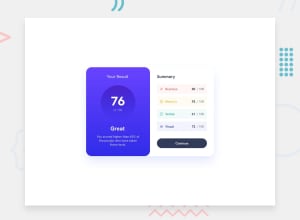
Design comparison
Solution retrospective
Hello guys, this is my solution. Please, check it and let me know what I can improve. Thanks a lot!
Community feedback
- @danielmrz-devPosted 10 months ago
Hello @romeopapa1992!
Your solution looks great!
I have a couple of suggestions (about semantic HTML) for improvement:
📌 First: Use
<main>to wrap the main content instead of<div>.Tags like
<div>and<span>are typical examples of non-semantic HTML elements. They serve only as content holders but give no indication as to what type of content they contain or what role that content plays on the page.📌 Second: Don't skip heading levels - start with
<h1>, then use<h2>, and so on.Unlike what most people think, it's not just about the size and weight of the text.
-
The
<h1>to<h6>tags are used to define HTML headings. -
<h1>defines the most important heading. -
<h6>defines the least important heading. -
Only use one
<h1>per page - this should represent the main heading/title for the whole page.
All these tag changes may have little or any visual impact but they make your HTML code more semantic and improve SEO optimization as well as the accessibility of your project.
I hope it helps!
Other than that, great job!
1 -
- @aykinsancakliPosted 10 months ago
Hello @romeopapa1992,
I think you did a great job on this one!
📌 Some Suggestions:
When using box shadows, we usually aim for a shadow that mimics the real world, so we prefer to use very subtle values. As the size of the component increases, the intensity and density of the shadow should also increase. For components like this, you can start with a shadow like this:
box-shadow: 0 12px 24px rgba(0, 0, 0, 0.015);This gives a more realistic and subtle shadow effect.
Hope this helps and I wish you all the best!
Aykın
1
Please log in to post a comment
Log in with GitHubJoin our Discord community
Join thousands of Frontend Mentor community members taking the challenges, sharing resources, helping each other, and chatting about all things front-end!
Join our Discord
